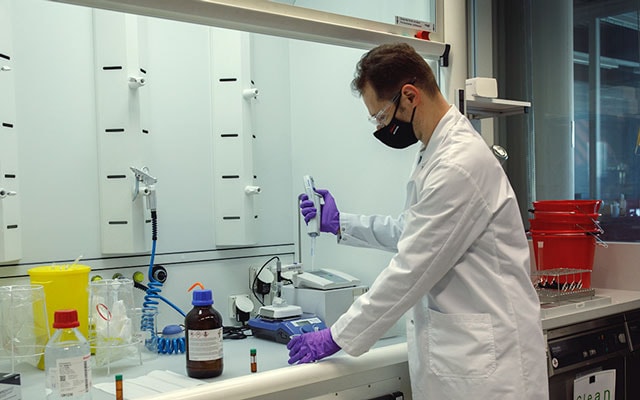PMI is transforming and staking its future on replacing cigarettes as quickly as possible—for the benefit of adult smokers, those who care about them, and public health globally.
And, as we transition from a traditional manufacturing and distribution business to an innovative science and technology company, IT is at the center of the journey.
As Chief Digital & Information Officer, my priority is to ensure that our technology systems best serve the needs and expectations of our consumers, while also being fully aligned to the company’s strategy and ambitions.
State-of-the-art IT is imperative to help us accelerate progress and achieve better results that benefit everyone. But it’s important to stress that this technology is not separate from our company’s transformation. It is intrinsically part of it.
Michael Voegele,
Chief Digital & Information Officer, Philip Morris International
Future-focused technology
As we progress toward a smoke-free future, PMI is focused on developing innovative smoke-free products for adults who would otherwise continue to smoke, while also building on our expertise in aerosol chemistry and physics, device technology, and clinical research.
Naturally, this multi-category approach requires a dynamic, future-focused IT system, built on the principles of innovation and agility.
When I joined PMI, I knew we needed a deep rethink of the tools and processes in place to support the journey of our products, as it was clear that our existing systems might have limited the speed at which we could bring innovations to market.
Our previous Product Lifecycle Managements (PLM) systems were optimized around the manufacture and B2B sales of combustible products. As we brought scale and diversity to our consumer-centric smoke-free portfolio, an opportunity arose to revamp processes, systems, and data structures that better fitted our new dynamic outlook.
Enabling multi-category management
We collaborated with Aras and IBM to reimagine our PLM system and create a more sustainable and efficient way to manage the development and commercialization of our products.
Leveraging the benefits of digital transformation, we developed what we call our Cloud Lean Innovative Product Platform (CLIPP) that enables efficiency, agility, optimization, and best-practice adoption to design the future-ready products.
It’s an agile PLM system that facilitates our transition toward a multicategory portfolio, streamlining processes and increasing speed to market. It also has flexible, open and smoothly upgradable technology to enable our current and future needs.
The CLIPP project relies on Aras Innovator, with IBM leading the integration of this software into our existing technology infrastructure. Aras is the perfect fit for a global PLM solution provider because it’s a resilient platform that can continually evolve. IBM’s shared understanding of our IT architecture is key to successfully implementing our digital transformation journey.
Fostering a change culture
CLIPP is a tangible example of PMI’s digital transformation. It illustrates the fundamental shifts in how we think and operate, as we transform for good as a company.
Its benefits include helping us progress toward our sustainability goals, as we can capture recyclability and reusable components, as well as elaborate on our partnerships.
But it’s not a new IT approach for its own sake. It’s about changing the business and the way we work—with the help of technology. And it will mean we are more sustainable, agile, and resilient as a company when we ultimately achieve our smoke-free ambition.
Top image posed by model. © Getty Images.









